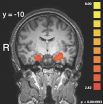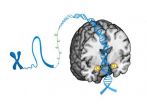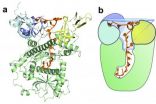Video-game playing for less than an hour a day is linked with better-adjusted children
The study suggests that the influence of video games on children is very small when compared with more 'enduring' factors
2014-08-04
(Press-News.org) A new study suggests video game-playing for less than an hour a day is linked with better-adjusted children and teenagers. The research, carried out by Oxford University, found that young people who indulged in a little video game-playing were associated with being better adjusted than those who had never played or those who were on video games for three hours or more. The study finds no positive or negative effects for young people who played 'moderately' between one to three hours a day. However, the study, published in the journal, Pediatrics, suggests that the influence of video games on children, for good or for ill, is very small when compared with more 'enduring' factors, such as whether the child is from a functioning family, their school relationships, and whether they are materially deprived.
This is thought to be the first study to examine both the positive and negative effects of gaming using a representative sample of children and adolescents. It involved nearly 5,000 young people, half male and half female, drawn from a nationally representative study of UK households. Participants, between 10 and 15 years old, were asked how much time they typically spent on console-based or computer-based games. The same group also answered questions about how satisfied they were with their lives, their levels of hyperactivity and inattention; empathy; and how they got on with their peers.
The results suggest that three in four British children and teenagers play video games on a daily basis, and that those who spent more than half their daily free time playing electronic games were not as well adjusted. It speculates that this could be because they miss out on other enriching activities and possibly expose themselves to inappropriate content designed for adults. Meanwhile, when compared to non-players and those who played very frequently, those who played video games for less than an hour (estimated to be less than one-third of their daily free time), were associated with the highest levels of sociability and were most likely to say they were satisfied with their lives. They also appeared to have fewer friendship and emotional problems, and reported less hyperactivity than the other groups.
Study author Dr Andrew Przybylski from the Oxford Internet Institute said: 'These results support recent laboratory-based experiments that have identified the downsides to playing electronic games. However, high levels of video game-playing appear to be only weakly linked to children's behavioural problems in the real world. Likewise, the small, positive effects we observed for low levels of play on electronic games do not support the idea that video games on their own can help children develop in an increasingly digital world.
'Some of the positive effects identified in past gaming research were mirrored in these data but the effects were quite small, suggesting that any benefits may be limited to a narrow range of action games. Further research needs to be carried out to look closely at the specific attributes of games that make them beneficial or harmful. It will also be important to identify how social environments such as family, peers, and the community shape how gaming experiences influence young people.'
Past research on non-interactive forms of entertainment have led to recommended time limits for how long children play video games, yet the study argues that such guidelines have little scientific basis. It suggests the relative benefits or risks of games vary widely in how they are structured and in the incentives they offer players. Previous research suggests that roughly half of young people in the UK are light players of less than an hour a day. Nearly one-third of children spend one to three hours, while roughly 10-15% of young people invest more than three hours daily or more than half of their free time each day playing electronic games.
INFORMATION:
For more information, please contact the University of Oxford News and Information Office on +44 (0)1865 280534 or email news.office@admin.ox.ac.uk
Notes for Editors:
The paper, 'Electronic gaming and psychosocial adjustment', by Andrew Przybylski is published by the journal, Pediatrics, on Monday, 4 August.
Children using console games like Nintendo Wii and Sony Play Stations, as well as computer-based games, were analysed. The research examined data of 2,436 male and 2,463 females drawn from the United Kingdom Understanding Society Household Longitudinal Study (which provides social, behavioural and health data).
Psychosocial adjustment was assessed through a self-report method known as the Strengths and Difficulty Questionnaire, which is the most widely validated behavioural screening questionnaire and is used in the work of researchers, educators and clinicians. END
ELSE PRESS RELEASES FROM THIS DATE:
WSU researchers see violent era in ancient Southwest
2014-08-04
PULLMAN, Wash.—It's a given that, in numbers terms, the 20th Century was the most violent in history, with civil war, purges and two World Wars killing as many as 200 million people.
But on a per-capita basis, Washington State University archaeologist Tim Kohler has documented a particularly bloody period more than eight centuries ago on what is now American soil. Between 1140 and 1180, in the central Mesa Verde of southwest Colorado, four relatively peaceful centuries of pueblo living devolved into several decades of violence.
Writing in the journal American Antiquity, ...
Kangaroos win when Aborigines hunt with fire
2014-08-04
SALT LAKE CITY, Aug. 4, 2014 – Australia's Aboriginal Martu people hunt kangaroos and set small grass fires to catch lizards, as they have for at least 2,000 years. A University of Utah researcher found such man-made disruption boosts kangaroo populations – showing how co-evolution helped marsupials and made Aborigines into unintentional conservationists.
"We have uncovered a framework that allows us to predict when human subsistence practices might be detrimental to the environment and when they might be beneficial," says Brian Codding, an assistant professor of anthropology.
"When ...
New trick for 'old' drug brings hope for pancreatic cancer patients
2014-08-04
Cancer Research UK scientists have found a new use for an old drug by showing that it shrinks a particular type of pancreatic cancer tumour and stops it spreading, according to research published in Gut*.
"It's a crucial step forward in developing new treatments for this devastating disease..." - Dr Jennifer Morton, study author
The scientists, at the Cancer Research UK Beatson Institute and the University of Glasgow, treated mice with pancreatic cancers caused by known genetic faults with the drug rapamycin**.
Previous clinical trials did not find this drug to be ...
Primary care telephone triage does not save money or reduce practice workload
2014-08-04
Demand for general practice appointments is rising rapidly, and in an attempt to deal with this, many practices have introduced systems of telephone triage. Patients are phoned by a doctor or nurse who either manages the problem on the phone, or agrees with the patient whether and how urgently they need to be seen.
A new large study, published in The Lancet on 4 August 2014 and funded by the UK National Institute for Health Research (NIHR), has investigated the potential value of telephone triage for patients and for the NHS. It concluded that patients who receive a telephone ...
Tumor suppressor mutations alone don't explain deadly cancer
2014-08-03
Although mutations in a gene dubbed "the guardian of the genome" are widely recognized as being associated with more aggressive forms of cancer, researchers at the University of California, San Diego School of Medicine have found evidence suggesting that the deleterious health effects of the mutated gene may in large part be due to other genetic abnormalities, at least in squamous cell head and neck cancers.
The study, published online August 3 in the journal Nature Genetics, shows that high mortality rates among head and neck cancer patients tend to occur only when mutations ...
Atlantic warming turbocharges Pacific trade winds
2014-08-03
New research has found rapid warming of the Atlantic Ocean, likely caused by global warming, has turbocharged Pacific Equatorial trade winds. Currently the winds are at a level never before seen on observed records, which extend back to the 1860s.
The increase in these winds has caused eastern tropical Pacific cooling, amplified the Californian drought, accelerated sea level rise three times faster than the global average in the Western Pacific and has slowed the rise of global average surface temperatures since 2001.
It may even be responsible for making El Nino events ...
Uncovering the 3-D structure of a key neuroreceptor
2014-08-03
Neurons are the cells of our brain, spinal cord, and overall nervous system. They form complex networks to communicate with each other through electrical signals that are carried by chemicals. These chemicals bind to structures on the surface of neurons that are called neuroreceptors, opening or closing electrical pathways that allow transmission of the signal from neuron to neuron. One neuroreceptor, called 5HT3-R, is involved in conditions like chemotherapy-induced nausea, anxiety, and various neurological disorders such as schizophrenia. Despite its clinical importance, ...
Fault trumps gruesome evidence when it comes to punishment
2014-08-03
Issues of crime and punishment, vengeance and justice date back to the dawn of human history, but it is only in the last few years that scientists have begun exploring the basic nature of the complex neural processes in the brain that underlie these fundamental behaviors.
Now a new brain imaging study – published online Aug. 3 by the journal Nature Neuroscience – has identified the brain mechanisms that underlie our judgment of how severely a person who has harmed another should be punished. Specifically, the study determined how the area of the brain that determines ...
Small DNA modifications predict brain's threat response
2014-08-03
DURHAM, N.C. -- The tiny addition of a chemical mark atop a gene that is well known for its involvement in clinical depression and posttraumatic stress disorder can affect the way a person's brain responds to threats, according to a new study by Duke University researchers.
The results, which appear online August 3 in Nature Neuroscience, go beyond genetics to help explain why some individuals may be more vulnerable than others to stress and stress-related psychiatric disorders.
The study focused on the serotonin transporter, a molecule that regulates the amount of ...
Knowing what to keep and what to trash: How an enzyme distinguishes cellular messages
2014-08-03
Cold Spring Harbor, NY – Every once in a while, we are forced to sort that stack of papers on the kitchen counter. Interspersed between the expired coupons and dozens of takeout menus are important documents like your car insurance or electric bill. So it isn't an option to simply drop it all in the trash at once – you need to read through the messages to be sure that you don't lose vital information.
In the cell, proteins similarly read through messages to distinguish what needs to be saved and what needs to be discarded. But, here, the process takes on a much more ...
LAST 30 PRESS RELEASES:
Kidney cancer study finds belzutifan plus pembrolizumab post-surgery helps patients at high risk for relapse stay cancer-free longer
Alkali cation effects in electrochemical carbon dioxide reduction
Test platforms for charging wireless cars now fit on a bench
$3 million NIH grant funds national study of Medicare Advantage’s benefit expansion into social supports
Amplified Sciences achieves CAP accreditation for cutting-edge diagnostic lab
Fred Hutch announces 12 recipients of the annual Harold M. Weintraub Graduate Student Award
Native forest litter helps rebuild soil life in post-mining landscapes
Mountain soils in arid regions may emit more greenhouse gas as climate shifts, new study finds
Pairing biochar with other soil amendments could unlock stronger gains in soil health
Why do we get a skip in our step when we’re happy? Thank dopamine
UC Irvine scientists uncover cellular mechanism behind muscle repair
Platform to map living brain noninvasively takes next big step
Stress-testing the Cascadia Subduction Zone reveals variability that could impact how earthquakes spread
We may be underestimating the true carbon cost of northern wildfires
Blood test predicts which bladder cancer patients may safely skip surgery
Kennesaw State's Vijay Anand honored as National Academy of Inventors Senior Member
Recovery from whaling reveals the role of age in Humpback reproduction
Can the canny tick help prevent disease like MS and cancer?
Newcomer children show lower rates of emergency department use for non‑urgent conditions, study finds
Cognitive and neuropsychiatric function in former American football players
From trash to climate tech: rubber gloves find new life as carbon capturers materials
A step towards needed treatments for hantaviruses in new molecular map
Boys are more motivated, while girls are more compassionate?
Study identifies opposing roles for IL6 and IL6R in long-term mortality
AI accurately spots medical disorder from privacy-conscious hand images
Transient Pauli blocking for broadband ultrafast optical switching
Political polarization can spur CO2 emissions, stymie climate action
Researchers develop new strategy for improving inverted perovskite solar cells
Yes! The role of YAP and CTGF as potential therapeutic targets for preventing severe liver disease
Pancreatic cancer may begin hiding from the immune system earlier than we thought
[Press-News.org] Video-game playing for less than an hour a day is linked with better-adjusted childrenThe study suggests that the influence of video games on children is very small when compared with more 'enduring' factors




